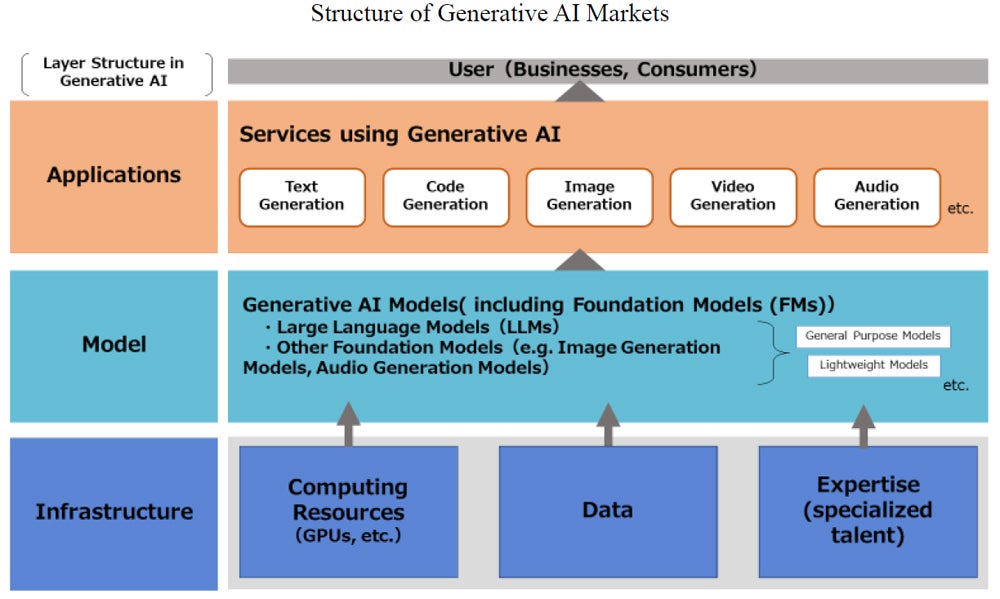Regulators in Japan and South Korea have commenced inquiries into the competitive implications of expanding generative AI markets in their jurisdictions. This follows concerns the fast-moving market may quickly be dominated by too few players, or that emerging anti-competitive practices may develop.
In October, the Japan Fair Trade Commission began a market study on generative AI to examine competition at the infrastructure, model, and application levels. As outlined in a discussion paper, it will also decide if changes may need to be made to its Antimonopoly Act and competition policy.
SEE: US, UK and EU make joint statement on fostering AI competition
The Korea Fair Trade Commission, meanwhile, launched its own AI market study in August of 50 domestic and international players in AI. The KFTC said it will analyse business relations and competition trends, and preemptively identify issues that may undermine competition and hurt consumers.
Japan looking at AI competition across all layers of technology
Japan’s competition regulator is expecting the local generative AI sector to experience a 47.2% average annual growth rate between 2023 and 2030. For the proper integration of these technologies within its economy and society, the regulatory body says it is “crucial to maintain a fair and competitive environment” in business.
The infrastructure layer
The JFTC is exploring issues such as the powerful dominance of NVIDIA in GPUs, the differences in training data international models and Japanese models use or have access to, and the difficulty for Japanese firms to hold on to AI talent expertise when up against the financial firepower of international players.
SEE: AI surge could trigger global chip shortage by 2026
The model layer
Japan points out that, while general purpose international LLMs lead in areas such as inferencing, multilingual competence, and multi-model inputs, homegrown players are differentiating on Japanese language performance or creating specialist LLM models for specific business or industry use cases.
The application layer
At the product level — where businesses are creating applications using either open source, proprietary, or internal models — the JFTC wants to establish what obstacles businesses face and what challenges exist in maintaining and promoting fair and free competition in the generative AI market.

Competition concerns include access to GPUs
While the JFTC has said it has not made any conclusions regarding market behaviours in generative AI, there were a number of areas that it would be using as a basis for discussion with market players.
Access restrictions and exclusion of competitors: If a small number of large enterprises are in a better position to acquire GPUs or data, or if access to other players is restricted, then new market entry opportunities and other competitive dynamics would be impacted, the JFTC noted.
Self-preferencing a company’s own services: One potential abuse of power in generative AI models could occur when the model’s own services appear more favourably in its inference results over those of competing companies, impacting competition for products and services in the market.
Tying service provision to use of a model: The JFTC has warned that there may be problems where a dominant provider of a service bundles the use of its own generative AI model as a condition of offering that service, thereby impacting competition among generative AI models.
Parallel conduct using generative AI: The JFTC has flagged concerns that similar or identical pricing strategies may emerge from alignment between underlying data and algorithms being used by different organisations, leading to an impact on competition.
Cornering expert talent via partnerships: One way organisations may seek to capture the market’s highly skilled talent for themselves is by forming partnerships, which the JFTC said could result in effects that were similar to a business transfer, attracting competition attention.
Korea to examine AI market share concentration
While acknowledging generative AI could be a significant driver of economic growth, South Korea’s competition regulator is concerned that the capital and compute intensive nature of AI technology gives rise to competition concerns. Like Japan, Korea’s announcement notes potential risks including:
- A handful of powerful companies controlling most market share in AI.
- Potential barriers to entry built by lack of access to key inputs for AI development.
The Trade Commission is using provisions in its Monopoly Regulation and Fair Trade Act to launch the study on the major players in the market. The investigation will examine business activities, goods and services within the AI sector, and any unfair trade practices, it said in the statement announcing the study.
Following the investigation, it expects to look at competition policy that can support innovation and fair competition in the AI industry, and publish an AI Policy Report by the end of 2024.
Australia is also watching generative AI competition
Australia’s competition regulator, the Australian Competition and Consumer Commission, has also indicated it is watching AI market developments. The tenth report in its Digital Platform Services Inquiry, due to be delivered to the government in March 2025, will examine aspects of generative AI competition.
The statement said: “The ACCC proposes to examine potential competition issues relating to generative AI. These may include the high barriers to entry in the market and the potential for large digital platforms to strengthen and expand their market power through the integration of Large Language Models (LLMs).
ACCC Chair Gina Cass-Gottlieb said the body is “following recent developments in generative AI closely.”
“Adoption has been extensive, and this technology continues to expand and develop at a rapid pace,” she said. “Generative AI products and services may present new opportunities, but also new challenges with major implications for our work.”

